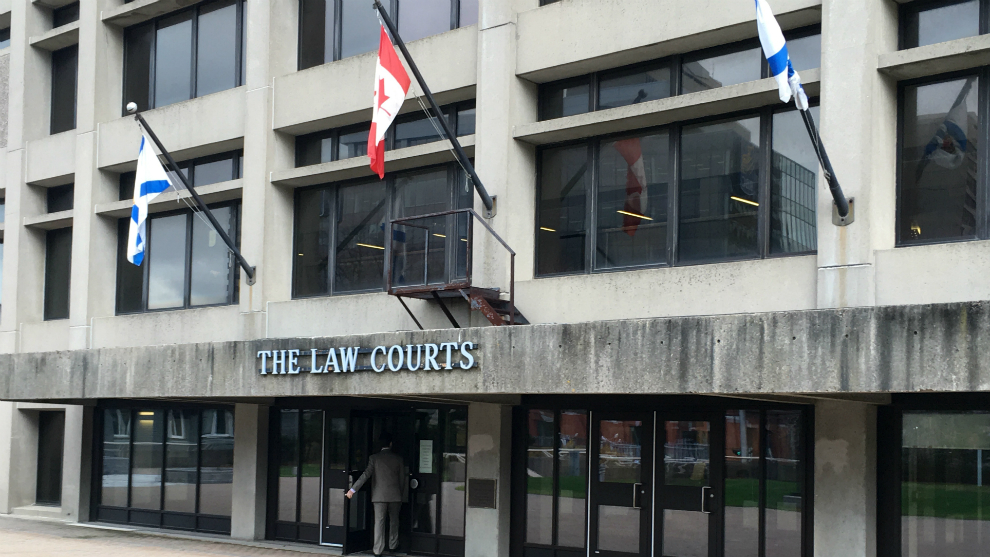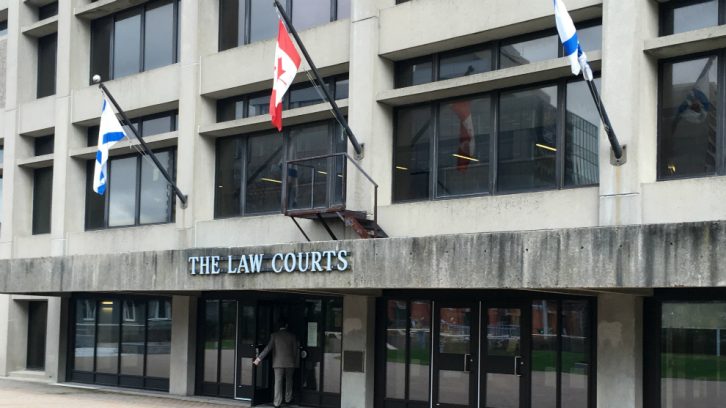Courts
Court of Appeal reserves decision in defamation case of Halifax woman
Laura Marson appeals $52,640 judgment after being defamed by provincial employee

caption
The Law Courts, 1815 Upper Water St. Halifax
caption
Laura Marson’s work placement with Dalhousie University security was ended after she was falsely accused.A Halifax woman defamed by a provincial government employee has appealed the more than $52,000 judgment she was awarded by a court earlier this year.
The case of Laura Marson (née Doucette) was heard in the Nova Scotia Court of Appeal on Wednesday.
Marson, 32, applied for a firearm licence in 2012 in order to complete a corrections and law enforcement program at Success College in Lower Sackville. David Grimes, an officer with the Department of Justice, was assigned to review her case. In the course of his investigation, Grimes alerted Marson’s college instructors as well as the Dalhousie University’s security services, where Marson was employed as part of her on-the-job training, that she may have been involved in the armed robbery of a Tim Hortons in 2009.
The allegation was never investigated, but it was a “significantly contributing reason” for Marson’s dismissal from her training at Dalhousie, said Nova Scotia Supreme Court Justice Denise Boudreau in her January 2016 decision.
Grimes and the province admitted the allegations were false just before the case was about to go to trial. They also admitted that Grimes had breached Marson’s privacy by revealing details about her past. Boudreau awarded Marson $35,000 in general damages, $15,000 in aggravated damages, and $2,640 to replace lost wages. No punitive damages were assessed.
“He used the opportunities of his position to cause havoc in the life of the plaintiff,” Boudreau said of Grimes in her decision. “He did this in complete ignorance of whether the allegations were true, and with a complete lack of diligence in determining their truth.”
On Wednesday, David Coles, Marson’s lawyer, argued that Boudreau erred in her determination of aggravated and punitive damages.
“I think she has ignored crucial evidence in finding this was reckless as opposed to intentional,” he said to the court.
Aggravated damages
Aggravated damages are awarded when the defendant’s conduct, from the moment of slander to the conclusion of the trial, is determined to have caused the plaintiff humiliation or distress. Coles argued that the defence’s initial plea of justification, as well as Boudreau’s findings that Grimes’ apology was “limited” and that he lacked remorse, were discounted as relevant factors in assessing the aggravated damages.
Defence lawyer Duane Eddy disagreed with Coles’ assessment, pointing to the province’s amended admission of liability and offer to settle.
“This court has to find that the trial judge misapplied the law with respect to aggravated damages, which she clearly did not,” he told the court.
Coles also noted that although Boudreau determined that the province was vicariously responsible for the actions of Grimes, she failed to account for the fact that the province was also a defendant itself.
“The trial judge makes no specific award against the province distinct from vicarious liability,” he told the court. “The province made no inquiry of Mr. Grimes or the righteousness of his actions.”
Punitive damages
The lack of punitive damages, intended to punish the defendant and act as a deterrent, was also a mistake, Coles argued. He indicated that the only discipline levied against Grimes by the province was a letter of warning.
“Hardly a robust sanction,” he said.
Coles also noted that Grimes had revealed details about a prior criminal discharge on Marson’s record. This disclosure, he reasoned, represented a separate harm worthy of punitive damages.
“Separate from the lies … he willfully disclosed private information,” said Coles. “He had no authority to leak it, and it constituted a compensable invasion of privacy.”
Eddy told the court that the Department of Justice had implemented new confidentiality policies to ensure that information would remain private. The lack of discipline for Grimes, he argued, did not warrant a reassessment of damages.
He also contended that awarding Marson separate damages from the province distinct of vicarious liability, or in relation to the breach of privacy, would result in Marson being unduly compensated.
“The defamatory statements were inextricably linked to Mr. Grimes disclosing her personal information,” said Eddy. “To reward more damages under a separate tort violates the rule against double-recovery.”
Marson attended the appeal with her husband. She declined to comment on the advice of her lawyer.
The court did not indicate when it would make a decision.

